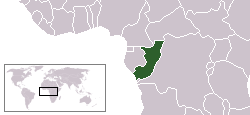People's Republic of the Congo
|
République Populaire du Congo People's Republic of the Congo |
|||||
|---|---|---|---|---|---|
|
|||||
|
|||||
| Official languages | French , as well as Kikongo and Lingála | ||||
| Capital | Brazzaville | ||||
| Form of government | People's Socialist Democracy | ||||
| Government system | Communist one-party system | ||||
| president | Mary Ngouabi | ||||
| prime minister | Henri Lopès | ||||
| Existence period | 1969-1991 | ||||
| currency | CFA franc BEAC | ||||
| National anthem | Les Trois Glorieuses | ||||

|
|||||
The People's Republic of the Congo ( French République Populaire du Congo ) was a socialist state ("communist state"), which was founded in 1969 as the successor to the Republic of the Congo . The country was the first officially real socialist state in Africa .
Led by the Congolese Labor Party (French Parti Congolais du Travail , abbreviation PCT ), the state existed until 1991, when the country was renamed the Republic of the Congo again and the government under the PCT early on amid the wave of the Congolese republicans Multi-party reforms in early 1990 were eliminated.
history
The People's Republic of the Congo was proclaimed on December 31, 1969 after a successful coup on September 4, 1968 in Brazzaville. The coup was triggered by organized militant leftists who overthrew the pro-European government. Marien Ngouabi was installed as the head of the state on December 31, 1968 and turned the country into a real socialist state within two years of the coup. After the Congolese National Assembly was abolished, Ngouabi formed a Marxist-Leninist party (known as the Congolese Labor Party (PCT)). This party was the only allowed party in the new state. Ngouabi was murdered in 1977.
Like the other (real) socialist countries in Africa, the People's Republic of the Congo had close ties with the Soviet Union and was part of the Eastern Bloc . This bond remained strong after the assassination attempt against Ngouabi in 1977. But the PCT government continued to have good relations with France .
In the middle of 1991, on June 10th, the Sovereign National Conference removed the word populaire ("people") from the country's official name, but also replaced the flag and anthem introduced by the PCT government in 1970 . The Sovereign National Conference ended the PCT government and appointed an interim Prime Minister, André Milongo , with executive powers. The last president Denis Sassou-Nguesso was allowed to remain in office.
Population development
The People's Republic of the Congo had 2,153,685 inhabitants in 1988. There were 15 different ethnic groups, although most of them were Congo , Sangha , M'Bochi, or Teke . 8,500 Europeans, mostly of French descent from colonial times in French Equatorial Africa , lived in the People's Republic of the Congo. French was the official language, but other recognized languages were given official status, including Kikongo and Lingala. Most of the population was concentrated in urban areas such as Brazzaville. The literacy rate was 80%, which is a unique achievement for the communist government within Africa; however, infant mortality was high.
Historical names
| Historical naming of the territories of the Congo | ||
|---|---|---|
| former Belgian colony | former French colony (A) | former Portuguese protectorate |
| 1877 colonized | 1880 colonized (G) |
from 1885 Portuguese Congo |
| from 1885 Congo Free State | from 1903 Central Congo | |
|
from 1908 Belgian Congo |
1910 French Congo | |
| from 1958 Republic of the Congo |
1956 Portuguese Congo under joint administration with Angola |
|
| June 30, 1960 independence | August 15, 1960 independence | |
|
1960 Republic of the Congo (called Congo-Léopoldville ) 1960 Proclamation of the Free Republic of Congo by lumumbist insurgents (recognized by 26 states, after about a year smashed by government troops) |
1960 Congolese Republic (called Congo-Brazzaville ) |
|
|
1961 Federal Republic of the Congo (called Congo-Léopoldville ) [1] , [2] 1964 Proclamation of the People's Republic of the Congo by insurgents in Stanleyville (only recognized by 7 states, smashed by government troops after a few months) |
||
| 1964 Democratic Republic of the Congo (called Congo-Léopoldville ) [3] |
1965 Republic of the Congo (called Congo-Brazzaville ) |
|
| 1966 Democratic Republic of the Congo (called Congo-Kinshasa ) | ||
| 1971 Republic of Zaire |
1969 People's Republic of the Congo |
1974 Portuguese Congo occupied by Angola |
|
1991/92 (Congo-Zaïre) draft constitution of the National Sovereign Conference suspended by Mobutu |
||
|
since 1997 Democratic Republic of the Congo |
since 1991 Republic of the Congo |
since 1975 Cabinda , province ( exclave ) of Angola |
|
(A)as part of French Equatorial Africa
(G)1888–1910 Gabon was also part of the French Congo
|
||
See also
Individual evidence
- ^ Timeline: Republic of the Congo
- ^ John F. Clark, "Congo: Transition and the Struggle to Consolidate," in Political Reform in Francophone Africa (1997), ed. John F. Clark and David E. Gardinier, 65.
- ^ Clark, "Congo: Transition and the Struggle to Consolidate," 69.


